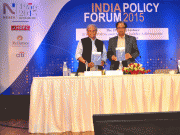The 2015 India Policy Forum Lecture by Professor Arvind Panagariya presented a retrospective of how India’s economic policy framework has evolved over several decades and the outcomes this has produced.
In a recent communication describing his plans for the Lecture, Panagariya has noted “…For the sake of argument, if India’s per capita income in 1950-51 is taken to be $1, it would have risen to $2 by 1990-91 and to $6 by 2013-14. In other words, per capita income doubled in the first 40 years of India’s development, but then tripled in a much shorter period of the next 23 years. Alongside this quickening of growth, poverty fell by only a modest amount prior to 1990-91, but fell much more sharply during 2004-05 to 2011-12. What accounts for these massive differences in economic outcomes before and after 1990-91? Why did India lose out in the early decades of its independence and what has led to its rise in more recent decades?”
This very interesting seminal review of India’s economic development by the head of NITI Aayog, India’s erstwhile Planning Commission recast in January 2015 by the government of Prime Minister Modi attracted a large audience. In response to a lively and engaged question and answer session that followed the lecture, Prof. Panagariya gave his views on a wide ranging topics on the prospects of India’s economy and stressed on the importance of a Policy Framework to be in place.
The IPF Lecture is part of an annual economic policy discussion event organized by NCAER in cooperation with the Brookings Institution. It comprises of an
annual international conference, the IPF Lecture and the
IPF Volume which is published by SAGE.
Arvind Panagariya is Vice-chairman, NITI Aayog, and has been the Jagdish Bhagwati Professor of Indian Political Economy and Director of the Columbia Program on Indian Economic Policies at Columbia University. Until his appointment to NITI, he was a Non-resident Senior Fellow at NCAER and delivered NCAER’s Second C D Deshmukh Lecture in February 2014. Panagariya has also been the Chief Economist of the Asian Development Bank and Professor of Economics and Co-director of the Center for International Economics at the University of Maryland, College Park. He has worked with the World Bank, IMF, WTO, and UNCTAD in various capacities.
Panagariya has written and edited more than a dozen books. His book, India: The Emerging Giant (2008) was listed as a top pick of 2008 by The Economist magazine. The Economist has described his latest book (with J. Bhagwati), Why Growth Matters (2013), as “a manifesto for policymakers and analysts.” Until his appointment to NITI, Panagariya was co-editor of NCAER’s annual India Policy Forum, the highest ranked Indian economics journal based on RePEc citation counts.
Panagariya has a PhD in Economics from Princeton University. In March 2012, the President of India honoured him for his contributions in the fields of economics and public policy with the Padma Bhushan.









